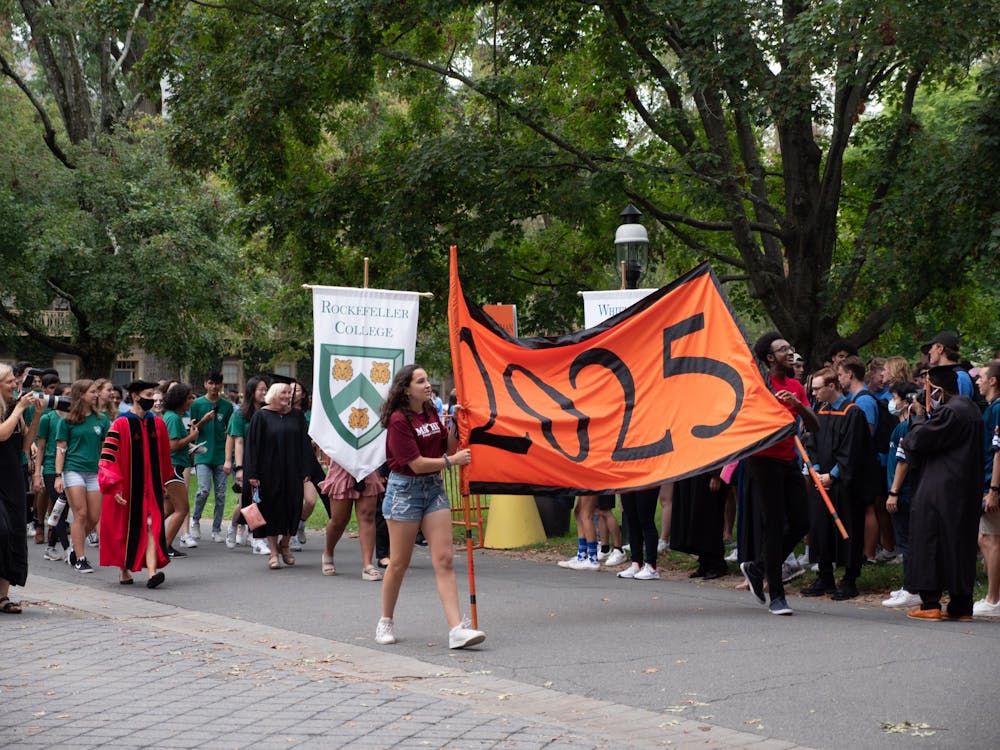As one of the panelists for the Gender & Sexuality “First Year Residential Experience” (FYRE) panels that occurred within the first month of classes, I was excited to finally discuss a topic that meant a lot to me and share my story and key information on experiences of gender and sexuality with my peers.
However, I became discouraged as I watched students walk out of the event because they “were in the wrong place,” leave halfway, or play on their phones the entire time.
As a first-year student who had to sit through many other FYRE panels myself, I definitely understood this sentiment — no one likes sitting through compulsory events that they view as irrelevant to their experience. However, when FYRE panels touch upon important topics that can impact the safety and tolerance of a community like Princeton’s, it makes it all the more important for students to listen. Instead of bombarding students with more lectures on top of the already overwhelming number of orientation events, Princeton should take a condensed approach that genuinely engages students with the content, provides students with the necessary information, and highlights the relevance.
The University’s FYRE panels aim to help students “develop the skills to build meaningful relationships with peers that may hold identities and backgrounds that are different from their own.”
Princeton is grossly mistaken if they believe that a set of panels with University affiliates lecturing at first-year students will instantly translate into character growth.
In theory, these panels are of paramount importance — they touch on important issues that promote values of respect and consideration within the community, as well as providing resources that students can turn to during their four years at the University. However, the poor execution of these panels takes what could be a valuable learning experience and makes students view them as a waste of time instead.
For example, these panels touch on topics such as gender and the LGBTQIA+ community. In a class year in which 1.5 percent of students identify as nonbinary or genderqueer and 27.5 percent are not heterosexual, and given that issues of biphobia and transphobia still plague the school, it could not be more necessary for students to learn about their classmates’ identities, even if they don’t identify with these groups, themselves.
The programming also includes panels on Sexual Harassment/Assault Advising, Resources and Education (SHARE), consent, and sexual harassment, important topics that students need to be educated on in order to prevent and safeguard against harm, especially on a college campus.

Princeton clearly recognizes the importance of these topics by making these panels mandatory. However, the structure of the panels, often in the form of hour-long presentations with speakers providing students with information about campus resources or aiming to spark dialogue, causes students to view these panels as tedious and unnecessary.
Although residential colleges attempt to take attendance at the panels by providing a QR code for registration, many students merely send these codes to their friends, allowing them to log their “attendance” without being physically present.
I’m not advocating for more stringent attendance policies here — even if there were a way to ensure full attendance, how much would students learn from panels if they didn’t want to be there in the first place?
Instead, the University should reevaluate its execution of them — rather than seminar-style sessions that students can easily ignore, Princeton should consider distilling the sessions into the most important information, thus cutting down the time that students need to be physically present for.

The University should also consider making them more engaging. For example, the PSAFE performance received incredible reviews, with the drama and humor resulting in students being more likely to pay attention and retain the information as a result.
One of the most enriching events at Princeton for me so far was during orientation week, when we discussed the Pre-read, “Moving Up Without Losing Your Way.” Being in an intimate community, sharing our own experiences, making the discussions relevant to ourselves, and listening to those of our peers’, along with discussing our unfiltered thoughts about the book, resulted in a bonding experience that brought our zee group closer together.
Princeton should emulate events like these, not lectures that students can easily tune out without retaining any information.
Students will naturally identify information that is important to them. My friends know the value of SHARE and the services they provide. I’ve witnessed people immediately pull out their phone and dial PSAFE after seeing someone inebriated to a dangerous extent. These topics are immediately relevant to our experiences here at Princeton, and we will utilize resources introduced to us without an accompanying hour-long lecture.
Ultimately, the University needs to trust that students don’t need this information drilled into them, as long as they provide the resources, preferably in their most basic form. Instead of overloading students with information, it would be exponentially more effective to educate them on the effects, importance, and relevance of the topics discussed through a smaller set of shorter small-group discussions that genuinely engage the students involved.
These panels have so much potential to shape the perspectives of incoming students and contribute to a culture of respect and understanding — it’s time for the execution to match the intent.
Stephenie Chen is a first-year from Hong Kong. She can be reached at stephchen@princeton.edu.








